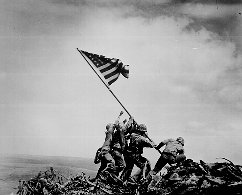Movie Review: Flags of Our Fathers 17 years, 6 months ago by Martey Dodoo

After my dinner plans fell through last night, I found myself in Harvard Square with a bit of wanderlust and $1.25 burning a hole in my pocket. I rode down the Red Line to Park Street, ate at McDonald's (first "restaurant" I saw), and then headed to Loews Boston Common to see what movies were playing. The only upcoming movies that looked interesting were Sofia Coppola's Marie Antoinette (18th century France meets 1980s music; 10:10) or Clint Eastwood's Iwo Jima film, Flags of Our Fathers. I was in a bit of a pessimistic mood (and thus not wishing to listen to electropop from 1984) and I felt sort of sorry after reading an New York Times article suggesting that Flags was not doing too well that morning, so I opted to wait an extra 10 minutes for the latter film (which I spent walking around Chinatown and the Common).
In arguments, when people need to reference a war where there was a clear definition of right and wrong, they consistently point to the Second World War. In the 60 years since the war, politicians have consistently made reference to the conflict, from ideas of the dangers of "global Communism" to islamofascism. Similarly, historians and sociologists have tried to claim that the American men and women who fought the war were somehow special, a so-called Greatest Generation.
In the film, this theory of exceptionalism, in both a collective and individual sense, is presented as a simplification used by those who want the world to be black and white. By retelling the story of the iconic Iwo Jima photograph, it cuts away at the foundation of an essential national myth (in this case, that the raising of the American flag on Iwo Jima was an important turning point in the war) in a way that many other historical movies do not.
While the movie succeeds in portraying combat as a deadly, messy, bloody business, the constant doses of battlefield horror intermingled with post-war sadness weigh on the viewer. While the movie was only about 2 hours long, it felt more like 3. Despite these flaws, I still think the film is worth watching, if only because of the questions it raises.